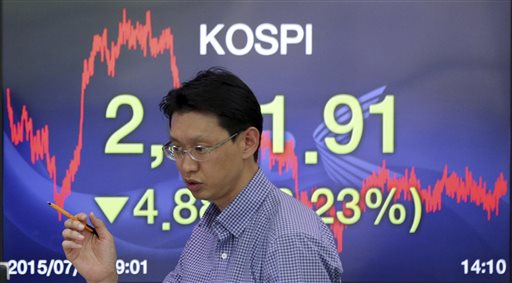
A currency trader works near the screen showing the Korea Composite Stock Price Index (KOSPI) at the foreign exchange dealing room of the Korea Exchange Bank headquarters in Seoul on Monday, July 20, 2015. Asian stocks mostly drifted lower Monday as investors put Greece’s debt crisis behind them to focus on the outlook for interest rates, corporate earnings and China’s economy. AP PHOTO/LEE JIN-MAN
HONG KONG–Asian stocks closed mixed Monday, with Sydney and Shanghai buoyed by optimism over Greece and China’s recent market rout while safe-haven gold slumped to a five-year low.
Shanghai led the gains, despite fresh volatility, as more firms began trading after being suspended at the height of the latest stock crisis that wiped billions off valuations.
The dollar pushed higher on expectations of a US interest rate rise this year after comments from US Federal Reserve chair Janet Yellen late last week, but gold tumbled as investors abandoned the yellow metal in search of better returns.
Shanghai ended 0.88 percent higher, advancing 34.76 points, to 3,992.11, while Sydney added 0.30 percent, or 16.00 points, to close at 5,686.90.
Hong Kong was flat, edging down 10.46 points to 25,404.81, while Seoul closed 0.17 percent lower, giving up 3.48 points to 2,073.31.
Tokyo and Jakarta were closed for public holidays.
Analysts said investors are now focusing more on macroeconomic data after the past few months were dominated by concerns over the fallout from the Greek debt crisis and a more than 30 percent plunge in Chinese stocks.
Greece’s banks reopened Monday after a three-week shutdown that is estimated to have cost the crisis-hit country 3.0 billion euros ($3.3 billion) in market shortages and export disruption.
Athens also started making a 4.2 billion euro payment due to the ECB and outstanding debts to the IMF, reassuring global financial markets that it would avoid a messy ‘Grexit’ from the single currency.
“With Greece off the front pages for now amid Alexis Tsipras achieving a 7.16 billion euro loan via the EFSM and a new bailout friendly government in play, we have seen the market price out the risk premium,” Chris Weston at IG in Sydney said in a note to clients.
“On top of this, the People’s Bank of China has continued market supportive measures even though the market was stabilizing and US corporates are also beating low-ball estimates.”
Eyes are now on Washington as the Federal Reserve considers when to raise interest rates from record lows as the US economy gets back up to speed. Last week Fed chief Janet Yellen stuck to her guns by predicting a rise this year.
Dollar rises
The expectation of a US rate rise comes as the central banks of Japan and Europe are spending hundreds of billions of dollars on bonds to support their respective economies, pushing down the value of the yen and euro.
“Focus returned to monetary policy divergences,” DBS Bank said in a commentary.
“Europe and Japan are set to keep their quantitative easing programs running well into 2016. The US is, on the other hand, looking to hike rates and normalize monetary policy,” it added.
The dollar bought 124.15 yen in Asia Monday compared with 124.09 yen in New York.
The euro fetched $1.0868 against $1.0830, while it was also at 134.84 yen from 134.38 yen.
US shares provided a healthy lead Friday, with the Nasdaq jumping 0.91 percent to a new record while the S&P 500 added 0.11 percent, although the Dow dropped 0.19 percent.
Chinese shares continued to advance Monday following a more than seven percent rise over the previous two weeks after Beijing introduced a series of measures to prevent a market meltdown.
Stocks had slumped for almost four weeks after hitting a high on June 12 before authorities intervened to stabilize the market.
Wu Kan, a Shanghai-based fund manager at Dragon Life Insurance Co., told Bloomberg News: “It looks like the rebound has legs as confidence has partially recovered.”
On oil markets, US benchmark West Texas Intermediate for August delivery fell 26 cents to $50.63 and Brent crude for September dipped 20 cents to $56.90 a barrel in afternoon trade.
Gold fell to as low as $1,105.80–its lowest since March 2010–before recovering slightly to $1,113.66. That compared to $1,144.18 late Friday.
The yellow metal, which is considered a safe asset in times of uncertainty, has steadily been falling as the US economy has shown signs of recovery in recent months.
“Any increase in US interest rates should further strengthen the dollar, prompting more fund outflows from commodities, metals and emerging market assets,” said Vattana Vongseenin, the chief executive officer of Phillip Asset Management Co. in Bangkok.
In other markets:
— Taipei fell 0.78 percent, or 70.98 points, to 8,975.00.
Taiwan Semiconductor Manufacturing Co. slipped 0.71 percent to Tw$139.0 while Largan Precision Co. rose 3.65 percent to Tw$3,550.0.
— Wellington rose 0.14 percent, or 8.15 points, to 5,861.92.
Air New Zealand added 0.94 percent to NZ$2.68 and Spark lifted 1.57 percent to NZ$2.905.
— Manila closed 1 percent lower, giving up 75.96 points to 7,541.17.
BDO Unibank dropped 1.43 percent to 103.50 pesos, Universal Robina gave up 2.20 percent to 182 pesos, and Ayala Corp. eased 0.66 percent to 758 pesos.
— Singapore rose 0.60 percent, or 20.03 points, to close at 3,373.48.
Singapore Telecom climbed 0.69 percent to end at Sg$4.35, while oil rig maker Keppel Corp. eased 12 percent to finish at Sg$8.17.
— Kuala Lumpur dipped 0.15 percent, or 2.60 points, to 1,724.13.
Tenaga Nasional dropped 0.65 percent to 12.28 ringgit, AMMB Holdings fell 0.85 percent to 5.83 ringgit while Sime Darby gained 0.23 percent to 8.61 ringgit.
— Mumbai fell 0.15 percent, or 43.19 points, to 28,420.12.
Aluminum company Hindalco Industries rose 1.91 percent to 109.45 rupees while Tata Motors fell 1.89 percent to 391.20 rupees.
— Bangkok fell 0.85 percent, or 12.60 points, to 1,466.71
Oil company PTT dropped 1.20 percent to 330 baht, while Siam Cement lost 0.39 percent to 512 baht.